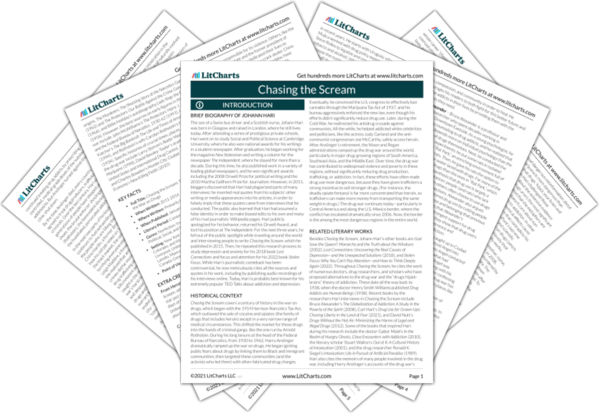Screams represent the drug war’s pointless strategy of fighting trauma by creating even more trauma. Through this misguided strategy, the drug war exacerbates the problems it claims to be solving.
The scream from the book’s title is one that Harry Anslinger heard as a young child. When his neighbor ran out of drugs, she began frantically screaming, and Anslinger had to rush to town to get her more. The woman’s scream—which represents her pain—left a lasting mark on Anslinger. Hari and the addiction doctors he interviews would likely view the woman’s drug use as her strategy for coping with her pain. But Anslinger viewed it as the cause of her pain. He tried to fight this pain by crushing it—or cracking down on drugs. Just as drug addicts use substances to heal their pain, Hari suggests, Anslinger and his supporters viewed the drug war as an easy solution to their own sense of pain and dislocation.
But the stories of extraordinary violence spread throughout Chasing the Scream show that Anslinger’s strategy has generated far more pain than it has healed. It creates a culture of violence that causes unspeakable suffering for people like Chino Hardin. It fuels the cruel government policies that ruin the lives of people like Marcia Powell and the young Black men that Leigh Maddox once arrested and now defends. It has made drugs more dangerous. And worst of all, it has further humiliated and marginalized addicts, who turned to drugs largely because they already felt humiliated and marginalized (at least, according to the research of doctors like Bruce Alexander and Gabor Maté). Thus, Hari suggests that the drug war’s error is fighting screams by piling on more screams—instead of by offering the support and connection that can actually silence them.
Screaming Quotes in Chasing the Scream
It is easy to judge Harry Anslinger. But if we are honest, I suspect that everybody who has ever loved an addict—everybody who has ever been an addict—has this impulse in them somewhere. Destroy the addiction. Kill the addiction. Throttle it with violence. Harry Anslinger is our own darkest impulses, given a government department and a license to kill.
As I researched this book, I traveled a long way from the farm fields of Pennsylvania—but at every step, I began to feel I was chasing the scream that terrified little Harry Anslinger all those years ago, as it echoed out across the world.
There would be many more bullets, but I was going to learn on my journey that Arnold Rothstein has not yet died. Every time he is killed, a harder and more vicious version of him emerges to fill the space provided by prohibition for a global criminal industry. Arnold Rothstein is the start of a lineup of criminals that runs through the Crips and the Bloods and Pablo Escobar to Chapo Guzman—each more vicious because he was strong enough to kill the last.
[…]
And I was going to see that, like Rothstein, Harry Anslinger is reincarnated in ever-tougher forms, too. Before this war is over, his successors were going to be deploying gunships along the coasts of America, imprisoning more people than any other society in human history, and spraying poisons from the air across foreign countries thousands of miles away from home to kill their drug crops.
“To see people’s faces and how they changed—they saw, I have worth, I have value. I’m able to help somebody else. I’m no longer just what they call me in the newspapers. […] If we’re off demonstrating, we’re having board meetings deciding what to do, and thinking about what our next actions could be, how is so and so doing, how can we help so and so because he got busted again—all that’s taking you away from just being totally fixed on ‘I got to get a drug, I got to get a drug, drug drug drug.’”
I try now to picture Harry as the first dose of opiates washes through his system and it makes him still and calm. What does he think in that moment? Does he think of Henry Smith Williams and Billie Holiday and his order to his agents to “shoot first” when they saw drugs? Does he think of the scream he heard all those years before as a little boy in a farmhouse in Altoona, and of all the people he had made scream since in an attempt to scrub this sensation from the human condition—or does he, for a moment, with the drugs in his hand, hear, at last, the dying of the scream?












